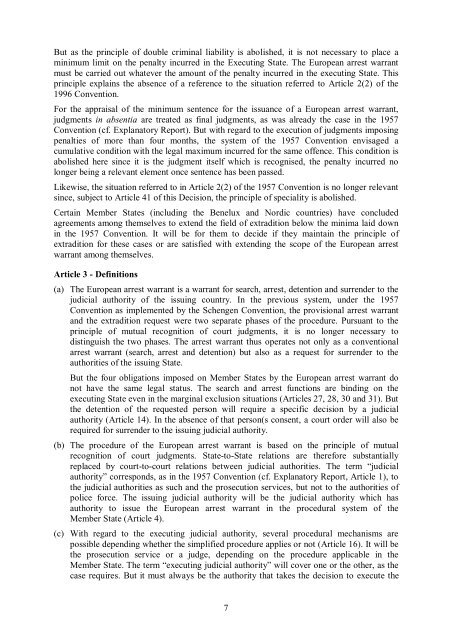the European arrest warrant - Statewatch
the European arrest warrant - Statewatch
the European arrest warrant - Statewatch
You also want an ePaper? Increase the reach of your titles
YUMPU automatically turns print PDFs into web optimized ePapers that Google loves.
But as <strong>the</strong> principle of double criminal liability is abolished, it is not necessary to place a<br />
minimum limit on <strong>the</strong> penalty incurred in <strong>the</strong> Executing State. The <strong>European</strong> <strong>arrest</strong> <strong>warrant</strong><br />
must be carried out whatever <strong>the</strong> amount of <strong>the</strong> penalty incurred in <strong>the</strong> executing State. This<br />
principle explains <strong>the</strong> absence of a reference to <strong>the</strong> situation referred to Article 2(2) of <strong>the</strong><br />
1996 Convention.<br />
For <strong>the</strong> appraisal of <strong>the</strong> minimum sentence for <strong>the</strong> issuance of a <strong>European</strong> <strong>arrest</strong> <strong>warrant</strong>,<br />
judgments in absentia are treated as final judgments, as was already <strong>the</strong> case in <strong>the</strong> 1957<br />
Convention (cf. Explanatory Report). But with regard to <strong>the</strong> execution of judgments imposing<br />
penalties of more than four months, <strong>the</strong> system of <strong>the</strong> 1957 Convention envisaged a<br />
cumulative condition with <strong>the</strong> legal maximum incurred for <strong>the</strong> same offence. This condition is<br />
abolished here since it is <strong>the</strong> judgment itself which is recognised, <strong>the</strong> penalty incurred no<br />
longer being a relevant element once sentence has been passed.<br />
Likewise, <strong>the</strong> situation referred to in Article 2(2) of <strong>the</strong> 1957 Convention is no longer relevant<br />
since, subject to Article 41 of this Decision, <strong>the</strong> principle of speciality is abolished.<br />
Certain Member States (including <strong>the</strong> Benelux and Nordic countries) have concluded<br />
agreements among <strong>the</strong>mselves to extend <strong>the</strong> field of extradition below <strong>the</strong> minima laid down<br />
in <strong>the</strong> 1957 Convention. It will be for <strong>the</strong>m to decide if <strong>the</strong>y maintain <strong>the</strong> principle of<br />
extradition for <strong>the</strong>se cases or are satisfied with extending <strong>the</strong> scope of <strong>the</strong> <strong>European</strong> <strong>arrest</strong><br />
<strong>warrant</strong> among <strong>the</strong>mselves.<br />
Article 3 - Definitions<br />
(a) The <strong>European</strong> <strong>arrest</strong> <strong>warrant</strong> is a <strong>warrant</strong> for search, <strong>arrest</strong>, detention and surrender to <strong>the</strong><br />
judicial authority of <strong>the</strong> issuing country. In <strong>the</strong> previous system, under <strong>the</strong> 1957<br />
Convention as implemented by <strong>the</strong> Schengen Convention, <strong>the</strong> provisional <strong>arrest</strong> <strong>warrant</strong><br />
and <strong>the</strong> extradition request were two separate phases of <strong>the</strong> procedure. Pursuant to <strong>the</strong><br />
principle of mutual recognition of court judgments, it is no longer necessary to<br />
distinguish <strong>the</strong> two phases. The <strong>arrest</strong> <strong>warrant</strong> thus operates not only as a conventional<br />
<strong>arrest</strong> <strong>warrant</strong> (search, <strong>arrest</strong> and detention) but also as a request for surrender to <strong>the</strong><br />
authorities of <strong>the</strong> issuing State.<br />
But <strong>the</strong> four obligations imposed on Member States by <strong>the</strong> <strong>European</strong> <strong>arrest</strong> <strong>warrant</strong> do<br />
not have <strong>the</strong> same legal status. The search and <strong>arrest</strong> functions are binding on <strong>the</strong><br />
executing State even in <strong>the</strong> marginal exclusion situations (Articles 27, 28, 30 and 31). But<br />
<strong>the</strong> detention of <strong>the</strong> requested person will require a specific decision by a judicial<br />
authority (Article 14). In <strong>the</strong> absence of that person(s consent, a court order will also be<br />
required for surrender to <strong>the</strong> issuing judicial authority.<br />
(b) The procedure of <strong>the</strong> <strong>European</strong> <strong>arrest</strong> <strong>warrant</strong> is based on <strong>the</strong> principle of mutual<br />
recognition of court judgments. State-to-State relations are <strong>the</strong>refore substantially<br />
replaced by court-to-court relations between judicial authorities. The term “judicial<br />
authority” corresponds, as in <strong>the</strong> 1957 Convention (cf. Explanatory Report, Article 1), to<br />
<strong>the</strong> judicial authorities as such and <strong>the</strong> prosecution services, but not to <strong>the</strong> authorities of<br />
police force. The issuing judicial authority will be <strong>the</strong> judicial authority which has<br />
authority to issue <strong>the</strong> <strong>European</strong> <strong>arrest</strong> <strong>warrant</strong> in <strong>the</strong> procedural system of <strong>the</strong><br />
Member State (Article 4).<br />
(c) With regard to <strong>the</strong> executing judicial authority, several procedural mechanisms are<br />
possible depending whe<strong>the</strong>r <strong>the</strong> simplified procedure applies or not (Article 16). It will be<br />
<strong>the</strong> prosecution service or a judge, depending on <strong>the</strong> procedure applicable in <strong>the</strong><br />
Member State. The term “executing judicial authority” will cover one or <strong>the</strong> o<strong>the</strong>r, as <strong>the</strong><br />
case requires. But it must always be <strong>the</strong> authority that takes <strong>the</strong> decision to execute <strong>the</strong><br />
7
















